 |
by LeanneB, SheKos editor
You might recall that in late January, I wrote about how the passage of the Lily Ledbetter Fair Pay Act's sister bill, the Paycheck Fairness Act, was crucial if the gender pay gap was ever to be seriously addressed legislatively. That's because while Ledbetter merely undid a SCOTUS decision that limited workers' ability to sue employers for unlawful pay imbalances, Paycheck Fairness actually addresses those imbalances in an effective manner.
To be perfectly honest, when I wrote that piece, I had little hope that the Paycheck Fairness Act would be revisited by the Senate in 2010. I fully expected it to remain unheard in committee, gathering dust. So it is with great surprise and excitement that I heard that the Senate Health, Education, Labor and Pensions committee actually held a hearing on the bill the morning of March 11. And how timely is this news that the death of the Paycheck Fairness Act has been greatly exaggerated! Because Tuesday, April 20 is Equal Pay Day.
Equal Pay Day involves thousands of local advocates in programs and activities focused on eradicating wage discrimination against women and people of color. Local Equal Pay Day activists organize rallies, lobby days, speak-outs, letter-writing campaigns, workshops, and meetings with employers, policy-makers, and enforcement agencies to promote effective solutions for closing the wage gap. Red is worn on this day as a symbol of how far women and minorities are "in the red" with their pay.
But those of us who were born to blog might be interested in the National Women's Law Center's approach to celebrating this event: the Blog for Fair Pay Day 2010.
On April 20, 2010, voices will rise up across the web in support of fair pay for women.
We’ve had a major success already with the signing of the Lilly Ledbetter Fair Pay Act — but the fight for equal pay isn’t over. Women are paid only 77 cents for every dollar earned by men, and for women of color, the numbers are even worse. A bill before the Senate, the Paycheck Fairness Act, would help to deter wage discrimination against women. Please urge your Senators to support this bill, and find out more about equal pay for women.
We’re calling on supporters to blog, tweet, and post to Facebook about the importance of equal pay for women on April 20, Equal Pay Day. Please sign up below to take part in Blog for Fair Pay Day 2010, and help us spread the word. You can also download the Blog for Fair Pay graphic to let your readers know you’re participating, or embed the #fairpay Twitter widget.
The NWLC has even provided a link to 2009's blogs if you need inspiration or simply want to see how well bloggers got the message out last year.
Let's see if we can fill up The Daily Kos with a call to pass the Paycheck Fairness Act next Tuesday. But while you're at it, don't forget to call and write your senators and express that desire directly to them.
◆◇◆◇◆◇◆◇◆◇◆◇◆◇
 THIS WEEK IN WOMEN'S HISTORY: Artists, Advocates and Activists
THIS WEEK IN WOMEN'S HISTORY: Artists, Advocates and Activists
by joedemocrat, SheKos contributor
- This week in 1880, Francis Perkins was born. She served as Secretary of Labor under President Franklin Roosevelt from 1933 to 1945. She played a significant role in passing major parts of the New Deal including the Social Security Act, the Public Works Administration and the Fair Labor Standards Act, which established the minimum wage, overtime pay and the 40 hour work week. These and other New Deal programs gave Americans more economic security during the Great Depression. She brought organized labor solidly into the Democratic New Deal coalition. She grew up in a well-to-do Republican family. However, in 1911 she watched 146 workers die in the infamous Triangle Shirtwaist Factory fire. This event played a large role in motivating her to advocate for workers' rights.
- This week in 1887, Florence Beatrice Price was born. She was the first African American symphonic composer. Her interest in music began at a young age; her first piece was published when she was just 11 years old.
- This week in 1891, Nella Larsen was born. She was an American writer during the Harlem Renaissance era. Her works include the novels Quicksand (1928) and Passing (1929).
- This week in 1930, Delores Huerta was born. She was the co-founder of the United Farm Workers of America. In 1998, Ms. Magazine named her one of three "Women of the Year." The Ladies Home Journal also listed her among the "100 Most Important Women of the 20th Century."
- This Week in 1939, African American singer Marian Anderson sang before an audience of 75,000 people at Lincoln Memorial in a free Easter Sunday concert. This was after The Daughters of the American Revolution refused allow her to perform for an integrated audience in Constitution Hall. The incident caused First Lady Eleanor Roosevelt to resign from the DAR in protest.
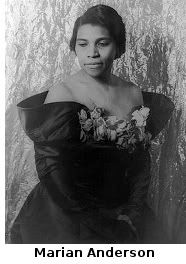
◆◇◆◇◆◇◆◇◆◇◆◇◆◇
 WOMEN'S WELLNESS WATCH: How Health Care Reform Affects Women
WOMEN'S WELLNESS WATCH: How Health Care Reform Affects Women
by pat of butter in a sea of grits, SheKos contributor
Thanks to earicicle for her essay in my Workplace column last week! I had a nice vacation by the sea and had the opportunity to feel the Mexicali earthquake. That was exciting.
I'm changing things up this week and discussing health care rather than work. The National Women's Law Center had a webinar last week focusing on what health care reform means for women. Here are some highlights.
- Insurers are banned from denying coverage for pre-existing conditions such as pregnancy, C-section, breast cancer, or being a victim of domestic violence.
- Health plans must cover maternity care, prescription drugs including contraceptives, and mental health care. Preventive care must be covered at no cost.
- The new law prohibits health plans from requiring authorization or prior approval for women to have access to obstetrical and gynecological care.
![]() Requiring maternity coverage is a leap forward that does not get discussed much. When I finished graduate school, I accepted a fellowship with a Federal agency under a privately funded program - in other words, my immediate employer was the fellowship organization rather than the Feds. The insurance coverage they provided us fellows, virtually all of whom were in our mid 20s to mid 30s, did not include maternity coverage - essentially the only high cost health "risk" that might be likely to occur during that two year time period. I made sure I didn't end up needing that coverage for a few more years, but if I had needed it I would have had to pay for the hospital out of pocket despite being ostensibly insured.
Requiring maternity coverage is a leap forward that does not get discussed much. When I finished graduate school, I accepted a fellowship with a Federal agency under a privately funded program - in other words, my immediate employer was the fellowship organization rather than the Feds. The insurance coverage they provided us fellows, virtually all of whom were in our mid 20s to mid 30s, did not include maternity coverage - essentially the only high cost health "risk" that might be likely to occur during that two year time period. I made sure I didn't end up needing that coverage for a few more years, but if I had needed it I would have had to pay for the hospital out of pocket despite being ostensibly insured. - Medicaid will be expanded to 133% of poverty, which will make around 4.5 million women newly eligible.
- Each state will have a new Health Insurance Exchange, which will function as an insurance shopping center where people can choose the health plan that works best for them. About 11 million women will receive subsidies to pay the costs of health plans available on the Exchanges. Subsidies will be available to those with incomes up to 400% of poverty, or about $88,000 a year for a family of four.
- The new law bans insurers from charging more to employers who have a predominantly female workforce. (I.e. no "gender rating" of employees.)
- There are new tax credits for small businesses to provide coverage for their employees.
- Young adults up to 26 may remain on their parents' insurance.
- The Medicare Part D "donut hole" is gradually closed between now and 2020. This will reduce pharmaceutical out-of-pocket costs for millions of women on Medicare: both seniors and the disabled.
- The law establishes a new national insurance program for long term care, called CLASS.
A critical concern that has come up during the discussion of this bill is abortion coverage. Under the new law, abortions are not covered on Exchange based plans. If you purchase health insurance through your state Exchange and want abortion coverage, you have to make two separate payments: one for the general health plan and a separate one for abortion coverage. Since most women probably don't plan on needing abortion coverage, this will likely reduce the number of women who are ultimately covered by insurance that pays for abortion.
We need to keep working to make sure that women have full access to reproductive health care in America, something that men take for granted every day.
◆◇◆◇◆◇◆◇◆◇◆◇◆◇
by Oke, SheKos contributor
- In Student Sexual Assault Safety Depends Partially on Privilege, cabaretic writes about good news on a college campus with regard to student attitude on date rape, but points out there is still a long way to go when it takes privilege to achieve an outcome which should, by all rights, be the default.
- In American Indian Women: Susan LaFlesche, Ojibwa diaries about an American Indian woman who should be more well-known, as she did things even few non-native women considered at the time. She was a doctor to her reservation, and a tireless worker for social justice.
- In What you can do about the Nebraska abortion ban that just passed, trustwomen writes about actions we can all take, residents or not, to help stem the tide against those who would outlaw abortion entirely, starting with a smugly self-serving law just passed by the Nebraska legislature. If you care about a woman's right to reproductive freedom, read the diary and help in your state.
- In The Abortion Rights Funds need your help, meerkoet writes about the Abortion Rights Fund and tells us "why the funds exist, why this work is critical, and how you as a progressive in this country can help." The diary is worth reading, and is a call to arms for those who want to support a national effort to keep abortion legal.
- In Firearms, freedom and feminism [RKBA], sierrak9s diaries about a subject that might not seem to have a clear connection to feminism, but which is, arguably, an important subject in the effort for women to be empowered to protect themselves. A compelling and provocative read.
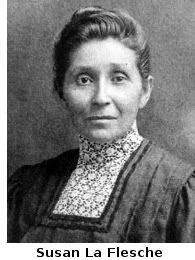
And from outside the orange
- Women Online In Iran Brave Heavy Web Surveillance
(WOMENSENEWS)--Iranian women have pushed the battle for equal rights online even as security forces aggressively monitor the Internet and shut down pro-democracy Web sites that fall out of step with the regime.
"Every print magazine for women we had was closed," Parvin Ardalan said in a recent phone interview from Sweden. "So we created a new world for ourselves in cyberspace."
- Walk a Mile in Her Shoes for Sexual Assault Awareness
Columbia, SC (WLTX) - April is Sexual Assault Awareness Month and organizations here in the Midlands have already held several events. But, Wednesday could be one of the most memorable - Walk a Mile in Her Shoes. Guys who participate will be walking a mile in high heels.
"They walk a mile in high heels to bring awareness to sexual assault. It's really not only for men to bring awareness and speak up about this issue, it's to show that it's not just a women's issue. It's children, it's men and anyone of all ages and races and backgrounds," explains Ginny Waller, Executive Director of Sexual Trauma Services of the Midlands.
The walk may get a few laughs, but the reason behind it causes anything but. There's no blanket description for a sexual assault victim, no one characteristic that binds them together. "Another issue we have with sexual assault is, it's one of those terms that nobody wants to talk about and one that we spend a lot of time trying to ignore and put into a dark place," Waller says.
- Anti-Choice Pharmacy in Virginia Closes Due to Lack of Business
A so-called "pro-life pharmacy" in Chantilly, Virginia, closed in March due to lack of business. Divine Mercy Care, or DMC Pharmacy, was one of seven anti-choice pharmacies in the country, stated The Washington Times. Products excluded from DMC Pharmacy's shelves included birth control pills, condoms, porn, tobacco and makeup, according to The Washington Post.
Located near a Catholic bookstore, two Catholic parishes and four Catholic churches, the pharmacy was situated in the Diocese of Arlington, with 428,417 members. When it opened its doors in October 2008, Robert Laird, its executive director, told The Washington Times he thought the 50,000 members of the surrounding churches would make for a solid customer base.
However, the pharmacy also did not sell retail items such as cosmetics, toys and fast food, so it lacked the convenience of a drugstore or stores like Kmart, both of which were within walking distance, said The Washington Post.
- As National Dems Focus On Stupak Seat, Abortion-Rights Groups Push For Saltonstall
National Democrats are narrowing their pool of candidates for retiring Rep. Bart Stupak's (D-Mich.) seat, which could put them at odds with abortion-rights groups that are endorsing former Charlevoix County, Mich., Commissioner Connie Saltonstall, Roll Call reports. Saltonstall, who supports abortion rights, challenged Stupak in the Aug. 3 primary before he announced he would not run for re-election.
According to Roll Call, Democrats could face a difficult battle in the socially conservative district, which includes Northern Michigan and the state's Upper Peninsula.
Abortion-rights groups are planning a concerted grass-roots campaign to support Saltonstall, and they are urging national Democrats to endorse a candidate who supports abortion rights, Roll Call reports. Terry O'Neill -- president of the National Organization for Women, which has endorsed Saltonstall -- said it would be a "huge mistake" if the Democratic Party endorses a candidate who does not support abortion rights. She added, "If the Democratic Party wants to be known as the party that cares about women's issues, it will not continue to support anti-women people."
- Despite reports of progress, reality for Afghan women is grim
WASHINGTON -- The numbers tell an upbeat story about efforts to empower and protect women in Afghanistan:
The country now has around 5.7 million children in school, of whom 35 percent are girls. There are 8,000 schools, including several hundred just for girls. Under the Taliban's rule, there were none. Women now have access to health care and hold a full 25 percent of the nation's parliament.
However, the reality for women is much grimmer.
The bulk of the girls' schools actually operate in the capital, Kabul. Women's access to health care, especially reproductive health care, is hampered by untrained midwives and a lack of access to doctors. Although women have representation in parliament, they don't have a real voice in the government.
◆◇◆◇◆◇◆◇◆◇◆◇◆◇
 GLBT NEWS THE KAT DRAGGED IN: Pride - It's Not Just For GLBTs Anymore!
GLBT NEWS THE KAT DRAGGED IN: Pride - It's Not Just For GLBTs Anymore!
by KentuckyKat, SheKos contributor
The Tea Partiers are at it again. Apparently, the blatant racism was insufficient for them so will now be selling Straight Pride tee shirts.
I have a hard time understanding these shirts. Has there been a time (of which I am unaware) when straight people were beaten, shunned and harassed for being straight? Is it necessary for them to reclaim their own value in response to their mistreatment? I don't see it...and I think that this is just another way to shame GLBTs...the following quotation sums up my thoughts very nicely:
Daryl Presgaves, spokesperson for the Gay Lesbian Straight Education Network: ""It’s sad and troubling that some parents instill values of exclusion and teach their children to disrespect and bully those who are different from
them. These shirts promote harassment and bullying of actual or perceived LGBT youth, plain and simple," he said in a statement. "We hope the parents at the very least have the common sense and decency to not let their children wear such shirts to school, where they would contribute to what is already an incredibly hostile environment for LGBT youth, especially in middle school, where 39 percent of LGBT middle school students experience physical assault in school because of their sexual orientation. Seeing young people where these shirts is yet another reminder of why Friday’s National Day of Silence is as important today as it was when students created it in 1996."
Read more: http://www.queerty.com/...
I can't say that this surprises me coming from this group. We've all seen their racism...others are connecting the dots as well:
Gay advocacy groups say the shirts are reminiscent of the "white pride" slogan adopted by racist groups who oppose equality.
"It’s like white supremacy," says Penny Gardner, president of the Lansing Association for Human Rights, a Lansing area lesbian, gay, bisexual and transgender rights group. "It’s as if they are saying the idea of supremacy is some how the American way. The American way is about equality, and equality is all we’re looking for."
Given that this week has already seen the birth of the Caucasian Law Enforcement Association, I expect that things will get worse before they get better. The collective meltdown of the straight, white males represented by the tea party scares me. It scares me that the continued increase in hate crimes against GLBTs will continue and it worries me that hate crimes against people of color will begin to increase as well. But more than that I worry that the hostility in the tea partiers will increase the hostility in our schools pushing more GLBT youth to suicide. Please consider visiting WGLB on Friday for more on the issue of GLBT suicide.
◆◇◆◇◆◇◆◇◆◇◆◇◆◇
 SAGE AND SWEETGRASS: Sexual Violence Against Native Women, Part II: Resource Providers
SAGE AND SWEETGRASS: Sexual Violence Against Native Women, Part II: Resource Providers
by Aji, SheKos contributor
American Indians are twice as likely to experience sexual assault crimes compared to all other races, and one in three Indian women reports having been raped during her lifetime.
Last week, we discussed the epidemic of sexual violence against Native American women, including some of the statistics like those above. I'm hopeful that we're beginning to see some changes in the federal government's approach to this issue, starting with President Obama's proclamation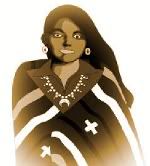 declaring April National Sexual Assault Awareness Month, in which he specifically highlighted the situation faced by too many Native women. However, government is still far behind the curve. The best and most effective work right now is being done by individual tribal entities and Native organizations.
declaring April National Sexual Assault Awareness Month, in which he specifically highlighted the situation faced by too many Native women. However, government is still far behind the curve. The best and most effective work right now is being done by individual tribal entities and Native organizations.
Last week, I promised to provide a list of some of the groups that provide services to Native women who are victims of sexual and domestic violence. The list below is far from exhaustive, but it will show some of the resources available - and will identify some of the gaps. Please note: Some of these organizations accept private financial and in-kind contributions to support their work; others need volunteers to help with outreach and other services. If you're concerned about sexual violence against women, please consider this often-overlooked sector when planning your charitable giving or personal activism.
Miigwech.
NATIVE RESOURCE PROVIDERS
1. Alaska Native Women's Coalition
Mission Statement:
We are committed to the elimination of personal and societal violence in the lives of women and children. We are dedicated to the empowerment of all victims and believe in the right of all people to live without fear, threat and oppression.
We believe that through exploring the traditional cultures of the native people of Alaska and taking a closer look at the historical impact of colonization, we can begin to better understand the grassroots causes for the increase in domestic violence, sexual assault, and stalking incidents.
ANWC also runs a shelter called "Our Grandmother's House," providing emergency shelter services to women and children who are victims of violence.
Contact: Alaska Native Women's Coalition Anvik, AK 99558 Phone: 907.663.6356 Fax: 907.456.2321 E-Mail: anwc@jacotainc.com
2. American Indians Against Abuse
Mission Statement:
The primary intent of American Indians Against Abuse, Inc. is to firmly address and promote elimination of violence and other abuses against American Indian women within families and communities throughout the eleven (11) Wisconsin tribes by supporting culturally sensitive programming specific to traditional customs, values, and teachings.
Contact: American Indians Against Abuse P.O. Box 1617 8558N County Road K Hayward, WI 54843-1617 Phone: 715.634.9980 Fax: 715.634.9982 E-Mail: aiaaawitribes@cheqnet.net
Mission Statement:
Traditionally, Indigenous Life Ways, Beliefs and Practices recognized the unique role of and the respect for all living things. In this context, Indigenous Women are respected; any abuse is not traditional and is not acceptable.
Indigenous Justice continues to ensure safety and balance in Life Ways for Indigenous Women and their Children.
As Daughters of the Land, Indigenous Women are in a reciprocal relationship with Mother Earth through Kinship, Ceremonies, Traditions, Language, Sustenance and Commit to do No Harm. Following the Ancestral Women’s Teachings, we Protect the Trust of Indigenous Life Ways through the Generosity of Selflessness, Advocacy and Sovereignty.
Contact: Clan Star P.O. Box 1630 Cherokee, NC 28719 Phone: 828.497.5507; 888.636.4748 Fax: 828.497.5688
4. Coalition to Stop Violence Against Native Women (CSVANW)
Mission statement:
To stop violence against Native women and children by advocating for social change in our communities. The CSVANW takes ownership and responsibility for the future of Native women and children by providing support, education, and advocacy using our strengths, power and unity to create Violence-Free Communities
The CSVANW provides victim assistance and support; sponsors education, training, and outreach; and serves as an information clearinghouse.
Contact: Coalition to Stop Violence Against Native Women 2401 12th St., N.W., #201N Albuquerque, NM 87104 Phone: 505.243.9199 Fax: 505.243.9966 E-Mail: csvanw@msn.com
5. First Nation's Women's Alliance
[No apparent Web presence.]
Contact: First Nations Women's Alliance P.O. Box 162 Tokio, ND 58379 Phone: 701.294.2081 Fax: 701.294.2082 Email: fnwa08@gmail.com
Mission Statement:
Our mission is to restore safety and integrity to Native women by assisting Native Sovereign Nations in strengthening their response domestic violence and sexual assault. We work to improve the safety of Native women who experience battering, dating violence, sexual assault, and stalking by assisting tribes with training, technical assistance and resource materials that specifically address violence against American Indian/Alaska Native women.
Our approach recognizes that individual Nations are responding to violence against women by creating strategies at the local level distinct to their available resources and cultural perspectives. We believe progress at the local level increases the opportunity to learn from each other and share effective strategies. The challenge for our Nations is to reclaim traditional views of women, developing a Native justice response that upholds accountability and works to end violence against Native women. It is our responsibility to develop strong, cooperative, formal working relationships with one another. It is within our grasp to dramatically alter our response to women who have been battered and sexually assaulted.
Contact: Mending the Sacred Hoop 202 E Superior Street Duluth, MN 55802-2152 Phone: 218.390.1952; 888.305.1650 Fax: 218.722.5775
7. Minnesota Indian Women’s Sexual Assault Coalition
Mission Statement:
Through unity we will strengthen our voices and build resources to create awareness and eliminate sexual violence against Indian women and children.
We will vigorously apply our efforts toward influencing social change and reclaim our traditional values that honor the sovereignty of Indian women and children.
Contact: Minnesota Indian Women's Sexual Assault Coalition 1619 Dayton Ave., Suite 303 St. Paul, MN 55104 Phone: 651.646.4800; 877.995.4800 Fax: 651.646.4798 E-Mail: Contact Form
8. Montana Native Women's Coalition
[Web site under construction; information currently available at The Healing Tree.]
Mission Statement:
The Montana Native Women’s Coalition will strengthen relationships between Tribal Domestic Violence Programs in order to improve the services for rural and urban Native American women and their children who are affected by violence.
The goal of this organization is to enhance networking relationships between domestic violence programs and improve services for urban and rural Native American women and children who are victims of domestic abuse. The Coalition plans to focus on addressing the issues of abused Native American women and provide leadership for programs serving disadvantaged victims throughout Montana.
An added purpose of the Coalition is to bring together Native American women leaders and representatives from state agencies that manage respective state and federal funding for domestic violence programming in Montana, to increase resources and support for tribal programs.
Contact: Montana Native Women's Coalition P.O. Box 541 Lame Deer, MT 59043 Phone: 406.477.3495 Fax: 406.477.3495
9. Niwhongh xw E:na:wh Stop the Violence Coalition, Inc.
[No apparent Web presence.]
Contact: Niwhongh xw E:na:wh Stop the Violence Coalition, Inc. P.O. Box 309 150 Mill Creek Road S. Marshall Lane & Hostler Creek Rd. Hoopa, CA 95546 Phone: 530.625.1662 Fax: 530.625.1677 E-Mail: nestvc@aol.com
10. Our Sister's Keeper Coalition
Mission Statement (excerpt; full statement at link):
As a Tribal non profit, non governmental Coalition provides an array of services focusing on prevention, intervention and advocacy for the victims of domestic violence.
We are guided by the philosophy that: • No one deserves to be abused. • Our clients have the capacity to help themselves and make their own decisions with OSKC acting as the facilitator and advocate. • Each individual who needs our services, whether victim or abuser, deserves our respect, compassion and support. • Violence is a learned behavior that can be changed with appropriate prevention and intervention. • The importance of active support for improved laws and governmental policies, on and off Tribal Reservations, that benefit victims of crime. • To support the victim to return their sacredness by providing wellness and reconciliation.
Our Sister’s Keeper Coalition (OSKC) a Native American Tribal Coalition, will provide services to communities within the 6th Judicial District which include (La Plata, San Juan and Archuleta Counties) or the towns of Ignacio, Bayfield, Durango, Silverton, Allison, Pagosa Springs and Arboles, and the two Ute Mountain Ute Tribes State of Colorado (Southern Ute and Ute Mountain Ute.
Our Sister's Keeper Coalition also serves regional Hispanic and Anglo populations.
Contact: Our Sister's Keeper Coalition P.O. Box 3416 Durango, CO 81302-3416 Phone: 970.247.7888 Fax: 970.247.7888 E-Mail: oursisterskeepercoalition@yahoo.com
Mission Statement (informal; from the blog):
PBWH provides emergency shelter and advocacy support for women on the Standing Rock reservation who have been victims of domestic violence or sexual assault.
Contact: Pretty Bird Woman House P.O. Box 596 McLaughlin, SD 57642
12. Southwest Indigenous Women's Coalition (
[No apparent Web presence.]
Contact: Southwest Indigenous Women's Coalition 4520 N. Central Ave. Suite 570B Phoenix, AZ 85012 Phone: 602-266-8434 Fax: 602-266-8440
13. Strong Hearted Native Women's Coalition
Mission Statement:
The Strong Hearted Native Women’s Coalition, Inc., by honoring our women ancestors, will advocate for women and their families by promoting safety and a traditional non-violent lifestyle. Working towards empowering women with the tools for independence, courage, and a strong direction to make healthy life choices for herself, her children, and family.
Contact: Strong Hearted Native Women's Coalition P.O. Box 2488 Valley Center, CA 92082 Phone: 760-644-4781 Fax: 760-742-3422 Email: strongheartedwomen@yahoo.com
14. Uniting Three Fires Against Violence (Web site under construction)
Mission Statement:
Uniting Three Fires Against Violence mission is to unite and empower Native American Communities in Michigan with the common goal of ending domestic violence and sexual assault. We are a collaborative effort committed to promoting positive changes for individuals who are experiencing violence or abuse. We are dedicated to providing resource, safety and advocacy to ensure the physical, mental, spiritual and emotional well-being of Native Americans victimized by violence.
Contact: Uniting Three Fires Against Violence P.O. Box 1836 Sault Ste. Marie, MI 49873 Phone: 906.253.9775 Fax: 906.253.9757 E-Mail: utfav@yahoo.com
15. We, Asdzani Coalition
[No apparent Web presence.]
Contact: We, Asdzani Coalition C/O Family Harmony Project P.O. Box 547 Crownpoint, NM 87313-0547 Phone: 505.786.5622 Fax: 505.786.5285
16. White Buffalo Calf Woman Society
Mission Statement (excerpt; full statement at link):
We are committed to providing shelter and advocacy for individuals victimized by violence. We recognize the necessity of a multi-faceted approach –the need to develop an effective response to systems in our community such as health, criminal justice, and other institutions that minimize violence against woman. We also believe it is necessary to raise community awareness by naming what has happened to us as indigenous women.
At the same time, we recognize that responding to systems may or may not make significant institutional changes that will stop violence against women. Therefore, we are also dedicated to exploring and creating actions that will move us toward a social transformation that will allow equity for women. We actively seek methods and processes that will facilitate nonviolent human interactions.
WBCWS, founded in 1977, was the first women's shelter organization in Indian Country, and the first dedicated to women of color.
Contact: White Buffalo Calf Woman Society P.O. Box 227 Mission, SD 57555 Phone: 605.856.2317 Fax: 605.856.2494 E-Mail: wbcws@gwtc.net
Mission Statement:
WomenSpirit Coalition mission is Eliminating Violence Against Native Women and Promoting the Well-Being of Native Families and Communities.
WomenSpirit Coalition Values
As Native Women and Allies, we embrace these values:
* Empowerment of Survivors * Restoration of Spiritual & Traditional practices that promote healing from trauma * Grassroots Organizing to end violence * Human Rights Advocacy * Local focus with Global Views of anti-violence work * Respectful & non-violent in our relationships * Inclusive * Use of Humor as a healing tool * Restorative Justice * Cultural Competence / Cultural Privacy * Native-centered approach * Sovereignty & Self-DeterminationContact: WomenSpirit Coalition P.O. Box 13260 Olympia, WA 98508-3260 Phone: 360.352.3120; 888.352.3120 Fax: 360.357.3858 E-Mail: WomensSpirit@msn.com
18. Yupik Women's Coalition
[No apparent Web presence.]
Contact: Yupik Women's Coalition P.O. Box 207 Emmonak, AK 99581-0207 Phone: 907.949.1434 Fax: 907.949.1718 E-Mail: emmows@unicom-alaska.com Email: emmows@unicom-alaska.com

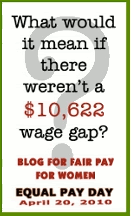
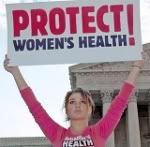 Requiring maternity coverage is a leap forward that does not get discussed much. When I finished graduate school, I accepted a fellowship with a Federal agency under a privately funded program - in other words, my immediate employer was the fellowship organization rather than the Feds. The insurance coverage they provided us fellows, virtually all of whom were in our mid 20s to mid 30s, did not include maternity coverage - essentially the only high cost health "risk" that might be likely to occur during that two year time period. I made sure I didn't end up needing that coverage for a few more years, but if I had needed it I would have had to pay for the hospital out of pocket despite being ostensibly insured.
Requiring maternity coverage is a leap forward that does not get discussed much. When I finished graduate school, I accepted a fellowship with a Federal agency under a privately funded program - in other words, my immediate employer was the fellowship organization rather than the Feds. The insurance coverage they provided us fellows, virtually all of whom were in our mid 20s to mid 30s, did not include maternity coverage - essentially the only high cost health "risk" that might be likely to occur during that two year time period. I made sure I didn't end up needing that coverage for a few more years, but if I had needed it I would have had to pay for the hospital out of pocket despite being ostensibly insured.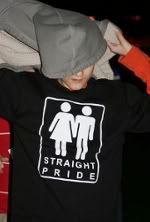 them. These shirts promote harassment and bullying of actual or perceived LGBT youth, plain and simple," he said in a statement. "We hope the parents at the very least have the common sense and decency to not let their children wear such shirts to school, where they would contribute to what is already an incredibly hostile environment for LGBT youth, especially in middle school, where 39 percent of LGBT middle school students experience physical assault in school because of their sexual orientation. Seeing young people where these shirts is yet another reminder of why Friday’s National Day of Silence is as important today as it was when students created it in 1996."
them. These shirts promote harassment and bullying of actual or perceived LGBT youth, plain and simple," he said in a statement. "We hope the parents at the very least have the common sense and decency to not let their children wear such shirts to school, where they would contribute to what is already an incredibly hostile environment for LGBT youth, especially in middle school, where 39 percent of LGBT middle school students experience physical assault in school because of their sexual orientation. Seeing young people where these shirts is yet another reminder of why Friday’s National Day of Silence is as important today as it was when students created it in 1996."